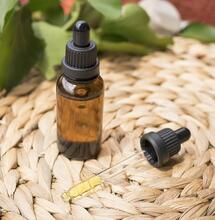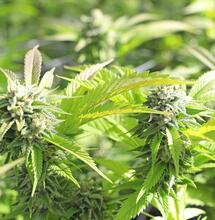Can You Be Allergic to Cannabis?

Although it may sound a bit strange, there are some people who seriously suffer from cannabis allergies. If you suffer from hay fever, there are great chances that you also may be sensitive to Cannabis. An allergic reaction may develop from physical contact with the plant, the presence of marijuana pollen in the air, inhaling smoke or vapor, or the various types of mold that might plague weed plants.
Cannabis allergies may affect those consuming Cannabis in any form and those who work with it and are regularly exposed to plant material. As with other allergies, a person's risk of suffering an outbreak due to marijuana or hemp increases with continual exposure to it. Genetic makeup may be another factor.
A cannabis reaction will manifest with typical allergy symptoms, like runny or stuffy nose, sneezing, red and watery eyes, or swelling around the eyes. Symptoms can also be more serious, such as respiratory ailments seen in asthma, bronchitis, or hay fever. In other instances, it may present as an itchy rash or hives outbreaks on the skin, as seen in dermatitis or urticaria.
THC is one of several recognized cannabis allergens. But it could also be something as innocent as hemp seeds. Cannabis also contains pollen, the most common of allergens, the powder that plants release to fertilize seeds of nearby plants.
How Common Are Cannabis Allergies?
Cannabis allergies are on the rise in recent years, but it's something that should not come as any surprise. With the ongoing legalization and industrialization of the sector, a more significant population has access to medical and recreational weed products. More people are using weed, and more people are reporting allergic reactions.
A small study from 2018 suggests that people are more likely to develop a cannabis allergy if they are sensitive or already allergic to dust mites, plants, molds, and cat dander.
Is There A Risk of Anaphylaxis?
Anaphylaxis is the most severe allergic reaction that could occur and may be life-threatening. However, such an extreme reaction is rare. It's seen in those with severe peanut or shellfish allergies. Although there's an exceptionally small chance, cannabis is not excluded from the list of triggers that might also lead to anaphylactic shock.
How to recognize anaphylaxis? It's a next-level allergic reaction with symptoms ranging from difficulty breathing, dizziness, itchy skin or pale skin, low blood pressure and fainting, swelling of the tongue and throat, etc. If you suspect anaphylaxis, seek medical help immediately.
Anything You Can Do to Prevent Allergies?
While you can't control everything, there are a few things that you can still do to downsize the risks of developing a cannabis allergy. First is food. Cannabis has similar allergen properties to tomatoes, eggplants, peaches, grapefruit, bananas, apples, almonds, and chestnuts. If you are allergic to any of these foods, you might be or become allergic to cannabis, too.
During growth, Cannabis plants can absorb dangerous levels of heavy metals such as Arsenic, Cobalt, Copper, Cadmium, Lead or Mercury. The contaminants may be present in the soil, water, or nutrients. Once they end up in the body, these substances can trigger an allergic reaction, among other things. Prolonged exposure can lead to more severe health issues such as organ damage and cancer.
Therefore, if you are homegrowing Cannabis, ensure that you test the water and soil and avoid dispensing low-grade nutrients that could be contaminated with pollutants. Either use high-quality supplements or go organic.
If you are buying, learn to recognize signs of bad weed. Always pay attention to the smell, visual appearance, or repeated adverse effects from consumption, such as headaches or nausea.
Besides Cannabis products should be grown carefully, they must also be stored properly to remain safe for consumption. For example, exposure to temperature extremes or high humidity levels may attract mold, another known allergen. Cannabis can also turn moldy when stored hastily post-harvest. Mold-induced allergy may present with nose inflammation, red or swelling eyes, skin rashes, or activating of asthma.

What Are the Treatment Outlooks?
Antihistamines and corticosteroids are known medicines used in treatment of allergies and accompanying symptoms. However, not everyone suffering will realize their weed is to blame.
In states where it's still illegal or where consumption is not discussed, marijuana exposure will probably not be mentioned as a possible allergy issue when you visit a doctor. In those cases, self-diagnosis or at least suspecting that cannabis could be a source of allergens could be critical. Then trying if antihistamine tablets, nasal sprays, inhalers, or decongestants can offer relief. That is if the symptoms are moderate.
If you are growing weed and suspect you are allergic to the plants, start wearing protective clothing, gloves, face masks and goggles to minimize direct exposure.
If you are legally using Cannabis, take a skin prick test. It will show swelling or itching in about 15-20 minutes if you are allergic. Blood tests can identify antibodies specific to a particular type of allergen.
Can CBD Help With Certain Allergy Symptoms?
If you are not allergic to marijuana or hemp, the piece of good news is that you can test CBD if it can actually help combat other allergies. CBD can intercept histamine-stimulating cells, the compounds that cause allergic symptoms such as runny nose and sneezing. This happens thanks to CBD's interaction with the endocannabinoid system.
So, for some people, CBD could help counteract histamine production and neutralize allergy symptoms. In addition, CBD can support the healthy function of the immune system, and it may play a role in maintaining skin health. Preliminary research hints that topical application of CBD can counteract skin rashes and inflammation.
Conclusion
Overall, we are missing a lot about the link between Cannabis and allergies. When does it help? When it doesn't? Knowledge on this subject is limited, but hopefully, with the expansion of legalization, more testing can be done, and more treatment options can become available. Researchers will need to precisely define allergens, standardize testing and develop successful courses of treatment for anyone who might struggle with cannabis allergy.











